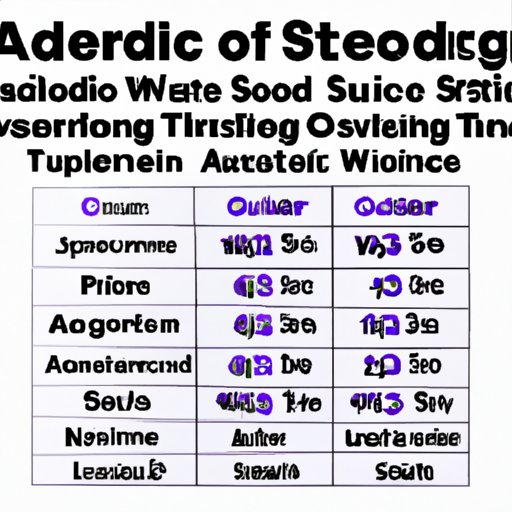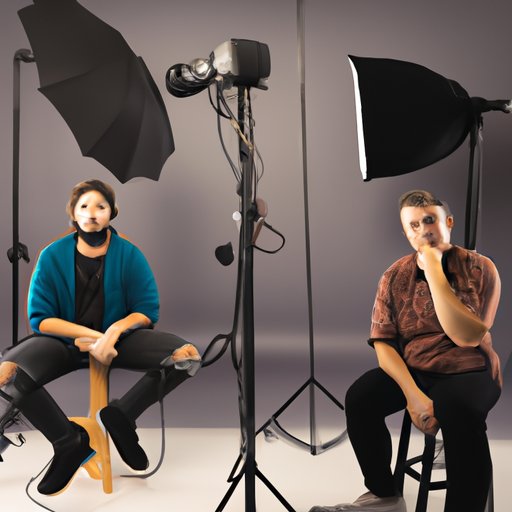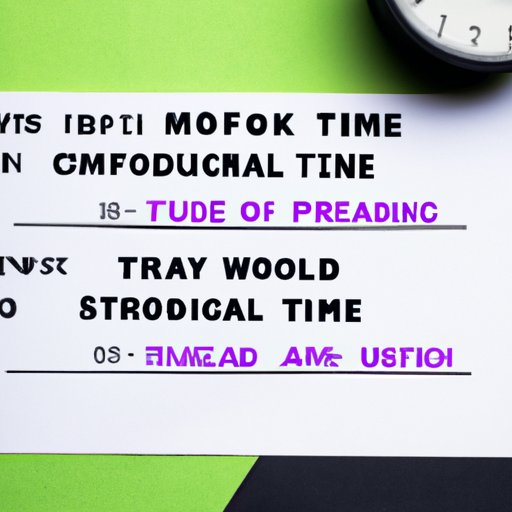Introduction
Studio time is a term used to describe the amount of time spent in a recording studio to record music, vocals, or other audio elements. This time includes setup, tracking, mixing, and mastering the audio. The cost of studio time can vary greatly depending on a number of factors, including the size and layout of the studio, the quality of equipment, and the experience of the engineer or producer.

Analyzing the Different Factors Affecting Studio Time Costs
When it comes to understanding the cost of studio time, there are a few key factors to consider.
Location
The location of the studio plays a large role in determining the cost of studio time. Studios located in larger cities typically charge higher rates due to higher overhead costs. On the other hand, studios located in smaller towns may offer lower rates due to lower overhead costs.
Size and Layout of the Studio
The size and layout of the studio can also influence the cost of studio time. Larger studios with more space and better acoustics will typically cost more than smaller studios with less space and poorer acoustics. The layout of the studio is also important as it can determine how quickly and efficiently sessions can be completed.
Equipment
The quality of the equipment available in the studio can also affect the cost of studio time. Studios with high-end equipment and a wide range of instruments will generally charge more than studios with basic equipment.
Experience of Engineer/Producer
The experience of the engineer or producer working in the studio can also impact the cost of studio time. More experienced engineers and producers are likely to charge higher rates due to their expertise and knowledge.

An Overview of Average Studio Time Costs
The average cost of studio time can vary greatly depending on location and the type of project being recorded. However, there are some general averages to consider.
National Averages
According to MusicXray, the national average cost for one hour of studio time is $60-$90. This includes the cost of the engineer and studio equipment, as well as any additional costs associated with the recording session.
Regional Averages
The cost of studio time can also vary greatly by region. For example, in Los Angeles, the average cost of one hour of studio time is $150-$200, while in Nashville it is $100-$150. It is important to do research into the local market when planning a recording session.
How to Secure Affordable Studio Time
If you’re looking to save money on studio time, there are a few steps you can take to ensure you get the best price possible.
Research
It’s important to do your research before booking a studio. Look for reviews of local studios and compare prices to find the most affordable option. You should also look for discounts offered by certain studios, such as package deals or special offers.
Negotiate
Once you’ve found a studio you’re interested in, don’t be afraid to negotiate. Many studios are willing to work with you on price if you’re able to book a longer session or multiple sessions.
Find Deals
There are also a number of online resources where you can find discounts and deals on studio time. Sites like Groupon and LivingSocial often have offers for recording studios, so be sure to check them out before booking.
What You Need to Know Before Booking Studio Time
Before booking a studio, it’s important to have a clear idea of what your project needs. Consider the type of music you’re recording, the number of people involved, and the length of the session. Having this information ready will help you book the right studio for your project.
Contract Terms
It’s also important to read through the contract terms carefully before signing. Make sure you understand any cancellation policies or additional fees that may apply.

Exploring the Pros and Cons of DIY vs. Professional Studio Time
When it comes to recording music, there are two main options: DIY (Do-It-Yourself) or professional studio time. Each has its own set of pros and cons.
DIY Pros
One of the main benefits of DIY recording is the cost savings. With DIY recording, you don’t need to rent a studio or hire an engineer, which can save you a significant amount of money. Additionally, DIY recording allows you to have more control over your project, as you can experiment with different sounds and techniques without worrying about time constraints.
DIY Cons
However, DIY recording does come with some drawbacks. Without access to professional equipment and experienced engineers, it can be difficult to achieve the desired sound quality. Additionally, it can be time-consuming to set up and record, as well as to mix and master.
Professional Pros
Working with a professional studio can provide a number of advantages. With access to high-quality equipment and experienced engineers, you can achieve a much higher level of sound quality. Additionally, having a professional engineer can help speed up the process, as they know how to get the best results in the least amount of time.
Professional Cons
The main downside of working with a professional studio is the cost. Professional studios typically charge higher rates than DIY recordings, as they have higher overhead costs. Additionally, you may not have as much creative control, as the engineer or producer may have different ideas about how to approach the project.

Tips for Maximizing Your Investment in Studio Time
Regardless of whether you choose DIY or professional studio time, there are a few tips to help you make the most of your investment.
Prepare Ahead of Time
It’s important to prepare ahead of time for your recording session. Have a plan for the session and practice your material beforehand so you can make the most of your time in the studio.
Be Organized
It’s also important to stay organized during the session. Have all of your materials ready to go and make sure everyone involved knows their roles. This will help minimize delays and maximize efficiency.
Communicate Clearly
Finally, make sure to communicate clearly with the engineer or producer. Explain your vision for the project and make sure everyone is on the same page. This will help ensure that the session runs smoothly and that you get the results you’re looking for.
Comparing Rates for Recording Studios in Your Area
When looking for a studio, it’s important to compare rates in your area. Here are a few tips for finding the best deal.
Online Research
The internet is a great resource for finding studios in your area. Sites like Yelp and Google Reviews can provide valuable information about different studios, as well as pricing information.
Ask Around
Word of mouth is another great way to find studios in your area. Ask friends and family who have recorded in the past for recommendations. They may be able to provide valuable insight into different studios and their rates.
Contact Studios Directly
Finally, don’t be afraid to contact studios directly. Many studios are willing to negotiate on pricing, so it’s worth reaching out to see if they can offer a better deal.
Conclusion
The cost of studio time can vary greatly depending on a number of factors, such as the size and layout of the studio, the quality of equipment, and the experience of the engineer or producer. It’s important to do your research and compare rates in your area to find the best deal. Additionally, it’s important to consider whether DIY or professional studio time is best for your project. With the right preparation and communication, you can make the most of your investment in studio time.
(Note: Is this article not meeting your expectations? Do you have knowledge or insights to share? Unlock new opportunities and expand your reach by joining our authors team. Click Registration to join us and share your expertise with our readers.)
